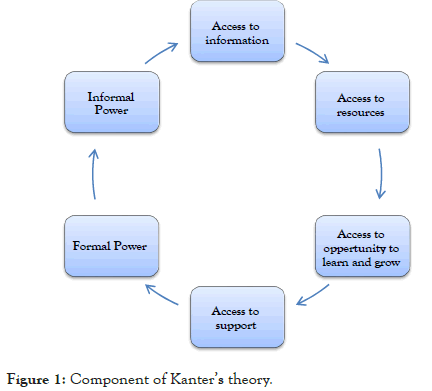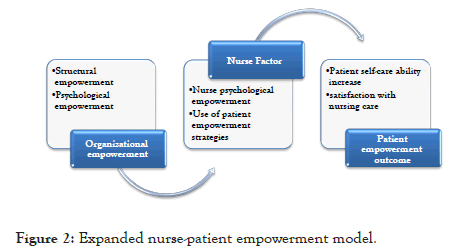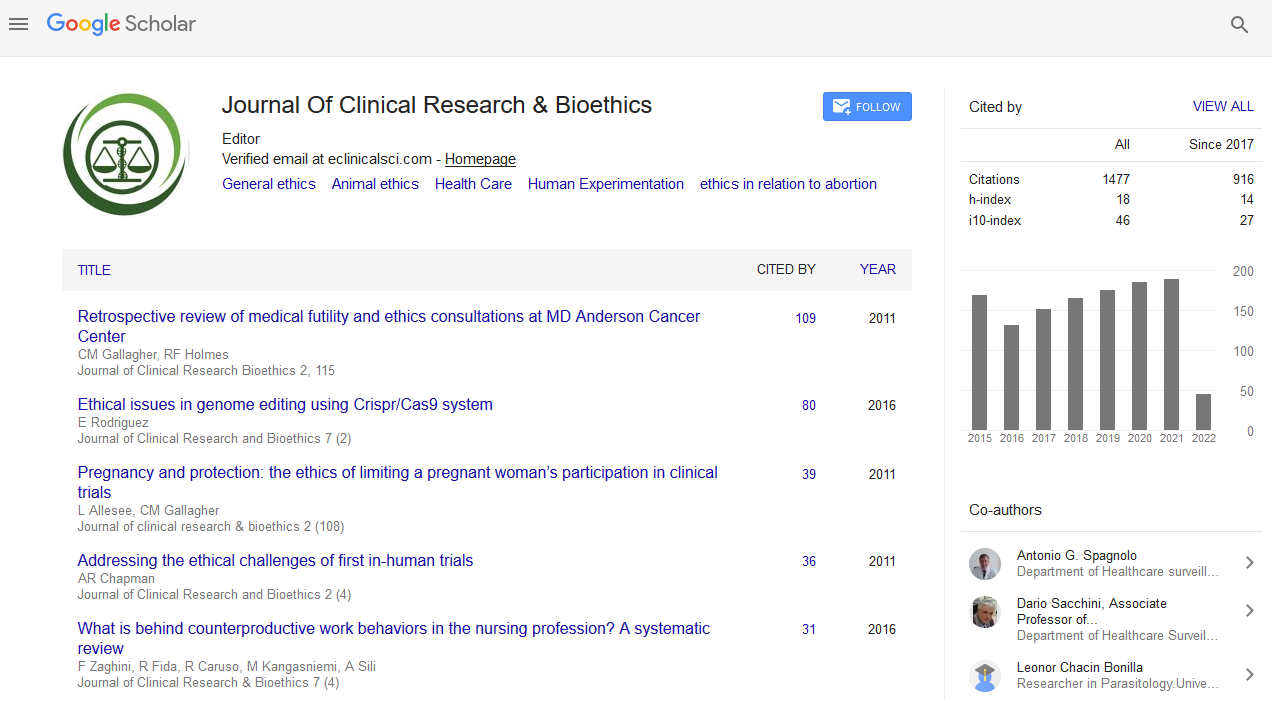PMC/PubMed Indexed Articles
Indexed In
- Open J Gate
- Genamics JournalSeek
- JournalTOCs
- RefSeek
- Hamdard University
- EBSCO A-Z
- OCLC- WorldCat
- Publons
- Geneva Foundation for Medical Education and Research
- Google Scholar
Useful Links
Share This Page
Journal Flyer

Open Access Journals
- Agri and Aquaculture
- Biochemistry
- Bioinformatics & Systems Biology
- Business & Management
- Chemistry
- Clinical Sciences
- Engineering
- Food & Nutrition
- General Science
- Genetics & Molecular Biology
- Immunology & Microbiology
- Medical Sciences
- Neuroscience & Psychology
- Nursing & Health Care
- Pharmaceutical Sciences
Review Article - (2020) Volume 11, Issue 6
Empowerment: A Change in Nursing and Health Care System
Mishal Liaqat1*, Rizwan Liaqat Awan2, Sumaira Sharif3 and Rabia Bibi42Law department, The University of Lahore, Gujrat Campus, Gujrat, Pakistan
3Department of Nursing, College of Nursing Allama Iqbal Medical College Lahore,, Lahore, Pakistan
4Lahore School of Nursing, University of Lahore, Pakistan
Received: 24-Oct-2020 Published: 16-Nov-2020, DOI: 10.35248/2155-9627.20.11.363
Abstract
Nurses are the largest workforce in the health care system providing direct care to the patients, families, and communities. Traditionally nursing is considering a profession of the provision of nurturing, competent, and compassionate care in a holistic way. Nevertheless, today's nursing career changes from a subordinate to a more independent role as a manager, leader, and change agent. Moreover, nurses are more educated and experts in their services. However, during the provision of care often facing ridiculous situations. Thus, needs to be empowered in their work and obligations.
Keywords
Health care system; Nurturing; Holistic way; Empowered
Introduction
Workplace Empowerment is the opportunity of a person to have access to resources, information and support needed to achieve organizational goals in performing their duties. Empowerment is very important for nurses as it enhances self-control, job satisfaction, and improves quality patient care. On the other hand, a powerless nurse is always depressed, having low self-esteem, and lacking the ability to decide in critical situations [1].
Empowerment in nurses is vital for both the health care system and society as a whole. For the health care system empowered nurse’s results in more job satisfaction, increased nurse retention, and ultimately enhancing their commitment towards their profession. For society empowered nurses to become a source of motivation for others and provide more compassionate care through community coordination and mobilization [2].
However, the reality is that all over the world nurses are facing problems including discrimination, gender bias, and disrespect. The situation is even worse in developing countries like Pakistan where nurses are quite powerless and being oppressed by society. Here’s still nursing is a profession that is facing the least opportunities and access to information and resources. That is evident through reporting of lack of confidence and low self-esteem among nurses. Consequently, nurses lacking the ability to make decisions in conflict situations. That could affect their ability in providing care to the patients and compromise their role as health care providers.
Scenario
A 65-year-old female patient came in a medical emergency of the public hospital presenting with a high blood pressure of 200/120 mmHg. After examining, the doctor advises the nurse to start Inj Isoket and take Blood pressure half-hourly to see the progress. The Nurse came to the patient and started the medicine. She expounded that she will come again after half an hour for taking blood pressure. Due to emergency and shortage of nursing staff, there were a lot of other patients that were waiting for medication administration. The patient’s son insisted to the nurse that she must continuously stay there and watch for his mother's condition. The nurse reassured him that she will be there and constantly observed his mother's condition but she has to attend to other patients too. But he was not agreed and gave her threats that he is sitting next to the secretary. He claimed that he had the power to expel her from the job. The nurse was getting upset and came to the ward manager for suggestions.
Nurses are engaged in the provision of direct patient care. During the provision of such care, they frequently encounter such situations that place them in a situation of conflict. A strong decision-making skill and empowerment regarding their professional liabilities is needed. Moreover, requires a high level of professional attitude and team support.
Kanter's Theory Of Empowerment
The concept of empowerment was first described for 30 years back [3]. A five-year study took place in a large organization and discovering the relationship between empowerment and organizational structure. Kanter’s theory suggests that a leader’s competency is mainly influenced by an organization's behavior in the form of providing formal and informal power. A structurally empowered working environment allows its employs to access to resources, information, and support [4].
Component Of Kanter's Theory
Kanter’s theory focuses on empowerment in two dimensions structural and psychological empowerment both play its role in gaining confidence, satisfaction, and its role in productivity. Structural empowerment offers organizational support and access to resources and information (Figure 1). Whereas psychological empowerment focuses on personal perception of control over the situation and a sense of being powerful [5,6].
Sources Of Power
Kanter describes organizations play its role in employ empowerment through six means. They are adequate 1) access to information, 2) access to support, 3) access to opportunity, 4) access to resources, and utilizing 5) formal and 6) informal power [4].
Access to information
Information deals with the knowledge essential for performing required activities. This address adequate knowledge, and competency in doing basic responsibilities in an organization. It includes practicing and sharing information in a timely order through email, newsletter, and websites. The organizations that maintain a channel of high information and open communication with their employs give them a feeling of empowerment in performing their duties and increase their level of satisfaction with their Jobs [7].
In nursing access to information is important for nurses in providing care. As a well-informed nurse will be more confident in dealing with patients and provide quality care. That results in enhancing patient satisfaction and outcome.
Access to support
Access to adequate support is needed for maximizing effectiveness in one’s duties. An organization that sets standards for jab description and maintains a channel of feedback enhances employs satisfaction. Support from senior managers and guidance is becoming a source of motivation for the employees. That encourages achieving a level of excellence in their work. Nurse’s adequate access to support gives a sense of security and independence in their work. An environment that provides a collaborative, interactive, facilitative approach could enhance self-esteem leading to a more autonomous approach in providing care to the patients [7].
Access to resources
Adequate access to resources and time management is a core component of empowerment. The adequate accessibility and availability of resources including man, material, money, and incentives are necessary for achieving job accomplishment and fulfilling their tasks [4].
Access to opportunity
The organizations offering their employs opportunities for professional growth and development play their role in empowering. As this develops new learning and awareness of the latest technology could enhance their working abilities and competency in performing work. In nursing, the encouraging, facilitative, and accessibility of an opportunity for upgrading knowledge and education empowered nurses in their job and would be a source of increasing quality work [4].
Formal power
In the Kanter’s model (1993), formal power is focusing on activities that are directly related to solving problems. It deals with flexibility according to the situation in which problems arise [5].
In dealing with patient’s nurses are standing in a position to have control over patients as they lacking their ability to manage health. Viewing the nurses as a source of power nurses can educate patients regarding self-care, hygiene, nutrition, exercise, and other basics activities of daily living. Consequently, transfer power to the patients by motivating independence in care. That will enhance quality care and patient outcome [8].
Informal power
Informal power develops from a person’s network of coalitions and compassionate relations. Informal power is the opportunity in teamwork with coordination and collaboration. A strong network of team building promotes collegiality and gives a sense of power among workers. This type of power is promoted when the nurse maintains a strong collaboration with their colleagues, other members of the health care team, and quick access to resources and support when needed. Moreover a strong, healthy relationship and support from family and friends is also a source of informal power [8,9].
Model Of Nurse/Patient Empower
The application of Kanter's theory to patient care in clinical practice suggested that there is a correlation between an organization's structure of working conditions, nursing care plan, and patient outcome. This model proposes that nurse empowerment is important for patient empowerment and create a logical pattern in the model.
In the nurse-patient relationship, it is evident that if nurses will be empowered, they will share and transfer their power with patients. Therefore, patients will be more empowered and increase patient quality of care. If nurses will be empowered and have access to information, and resources. The patients will have access to information and resources and will have a greater opportunity to promote their health and prevent illness. Finally, it is suggested that a combination of nurse-patient empowerment result in better communication, shortened hospital stay, increase patient satisfaction, greater self-care ability, and achieving the goal of positive health in Figure 2.

Figure 1: Component of Kanter’s theory.

Figure 2: Expanded nurse-patient empowerment model.
Strategies To Resolve Problems
In the above scenario, it is clear that the nurse standing in the right position as she has an obligation towards all patients present in the emergency at that time. Due to staff shortage, the nurse couldn't stand at the side of one patient only while many other patients were waiting. But due to our cultural constraints and male dominant society many patients and their relatives use their positional powers to influence nurses and create hurdles in performing their duties. That could affect badly on nurses' well-being in the form of lowering their confidence, self-esteem, and often create embarrassing situations. Therefore, there is a dire need for effective strategies that may help nurses when encountering such kind of situations.
I. First nurses should be empowered structurally and psychologically and this could be possible when nurses have adequate access to information, resources, support, and opportunities for learning and professional development. Timely access to information regarding organizational policies and job descriptions will make them confident to make decisions in such situations. Access to adequate support and resources gives a sense of security.
II. The health care system is a diverse environment that is continuously changing and requires effective decision-making skills among nurses. Nurses should be skillful in clinical decision making to quickly analyze the situation and make an effective plan of care that meets the patient's needs in an effective way [10]. Through an effective decision-making ability, nurses should assess the complexity of the situation and take appropriate actions accordingly. This could enhance nurse-patient therapeutic relationships and increased patient satisfaction.
III. Education plays a key role in professional growth and development. An in-service education program refreshes nurses' knowledge and enhances their confidence during the provision of patient care. An empowering educational model should integrate into clinical practice give nurses an opportunity for professional grooming and achieving mastery of the skills [11].
IV. Reflection in nursing practice plays a significant role in professional nursing practice and learning in clinical practice. Through reflection, nurses learn critical thinking and analyze the situation in a new direction and make innovative strategies to handle situations of conflicts. It is evident in research that reflection help in learning increases awareness among nurses to implement new strategies to solve problems and take an initiative to change the practice through the innovative plan of action [12].
V. Nursing managers have an important role in empowering their subordinates. They promote a healthy facilitative environment in which high-quality patient care would be possible. They play an essential role in empowering nurses to perform their duties to their maximal level of excellence. They should make effective strategies that make it possible for the participation of every staff nurse in decision making. A participative leadership style of nurse manager promote their staff empowerment and increase their quality of work and patient care outcome [7].
VI. A trusting transformational relationship of nurse managers with their staff nurses is crucial for their mental peace and quality care. An environment that promotes decision-making skills in a critical situation and effective support from managers and administration enhance confidence and improve quality care. However structural empowerment is needed for decision making [13].
Conclusion
The health care system is a diverse environment that is continuously changing and requires effective decision-making skills among nurses. Nurses should be skillful in clinical decision making to quickly analyze the situation and make an effective plan of care that ineffectively meets the patient's needs. Due to its diversity nurses often meet such situations that demand critical thinking and decision-making skills. Organizations should play their role in empowering their managers and staff. Such policies and goals should be made that provide dedicated support to their employees in conflict and critical situations. Consequently, play its role in providing quality care and high patient outcome through the empowerment of their employees.
Recommendations
In light of the above following recommendations would be suggested:
• At the organizational level, clear policies should be made regarding their employees ' self- respect and job security should be provided.
• A policy should be made to encourage staff to report such cases and an action committee should be made to handle such situations in which patients trying to influence workers and create hurdles in performing their duties.
• A clear policy statement should be made that guides the worker to provide the emergency and immediately necessary care to the patient and refer that person for further advice.
• The policy regarding dealing with employees should be display and written inpatient admission form. Therefore, everyone knows adequate behavior and attitude towards employees.
• The administrator and manager should provide support in terms of physical and psychological to their workers and empowered them in such situations.
• A strong multidisciplinary team coordination system should be introduced that enhances workers' confidence and psychological well-being.
• There should be a regular program and training of staff professional development that empowered them to handle wisely in such situations.
REFERENCES
- Mudallal RH, Wafa MO, Nahid FAH. Nurses’ burnout: the influence of leader empowering behaviors, work conditions, and demographic traits. Inquiry. 2017; 54: 990-994.
- Gulzar S. A qualitative study of nursing leader's perceptions of professional empowerment amongst Pakistani nurses. Int J Nurs Educ. 2015; 7(3):247-251.
- Kanter I. The probability density function of the monopulse ratio for N looks at a combination of constant and Rayleigh targets. IEEE Trans. 1977; 23(5): 643-648.
- Mota A. Structural Empowerment: A Qualitative Inquiry Into the Work Life of the Oncology Nurse. St. John Fisher. 2015.
- Kanter AS. A Home of One's Own: The Fair Housing Amendments Act of 1988 and Housing Discrimination Against People with Mental Disabilities. Amer L Rev. 1993; 43:925.
- Bergquist T. Impact of Empowerment and Autonomy on the Nursing Director's Intent to Stay. 2018.
- Asiri SA. The association of leadership styles and empowerment with nurses’ organizational commitment in an acute health care setting: a cross-sectional study. BMC Nurs. 2016. 15(1): 33-38.
- Van BP. Nurse managers' perceptions and experiences regarding staff nurse empowerment: A qualitative study. Front Psychol. 2015; 6: 81-85.
- Laschinger HKS, Shamian J. The impact of workplace empowerment, organizational trust on staff nurses' work satisfaction and organizational commitment. Adv health care manage. 2002; 26(3): 7-23.
- Ahn YHJ. Factors affecting Korean nursing student empowerment in clinical practice. Nurse Educ Today. 2015; 35(12): 1301-1306.
- Chaghari M. Empowering education: A new model for in-service training of nursing staff. J Adv Med Educ Prof. 2017; 5(1): 26-30.
- Miraglia R. Asselin, Reflection as an educational strategy in nursing professional development: An integrative review. J Nurses Prof Dev. 2015; 31(2): 62-72.
- Dweik AG. Work-related empowerment among nurses: Literature review. Int J Product Qual Manag. 2016; 19(2): 168-186.
Citation: Liaqat M, Awan RL, Sharif S, Bibi R (2020) Empowerment: A Change in Nursing and Health Care System. J Clin Res Bioeth. 11:363.
Copyright: © 2020 Liaqat M, et al. This is an open-access article distributed under the terms of the Creative Commons Attribution License, which permits unrestricted use, distribution, and reproduction in any medium, provided the original author and source are credited.


